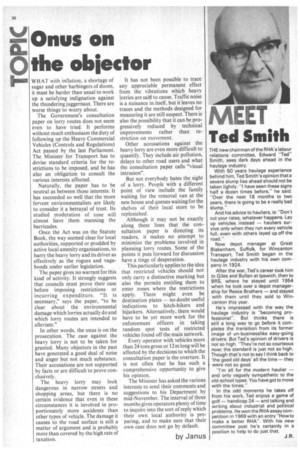Onus on the objector
Page 38

If you've noticed an error in this article please click here to report it so we can fix it.
WHAT with inflation, a shortage of sugar and other harbingers of doom, it must be harder than usual to work up a satisfying indignation against the thundering juggernaut. There are worse things to worry about.
The Government's consultation paper on lorry routes does not seem even to have tried. It performs without much enthusiasm the duty of following up the Heavy Commercial Vehicles (Controls and Regulations) Act passed by the last Parliament. The Minister for Transport has to devise standard criteria for the restrictions to be imposed, and he has also an obligation to consult the various interests affected.
Naturally, the paper has to be neutral as between those interests. It has succeeded so well that the more fervent environmentalists are likely to consider it a betrayal of trust. Its studied moderation of tone will. almost have them manning the barricades.
Once the Act was on the Statute Book, the way seemed clear for local authorities, supported or prodded by active local amenity organisations, to harry the heavy lorry and its driver as effectively as the rogues and vagabonds under earlier legislation.
The paper gives no warrant for this kind of activity. It strongly suggests that councils must prove their case before imposing restrictions or incurring expenditure. "It is necessary," says the paper, "to be clear about the environmental damage which lorries actually do and which lorry routes are intended to alleviate."
In other words, the onus is on the prosecution. The case against the heavy lorry is not to be taken for granted. Many objectors in the past have generated a good deal of noise and anger but not much substance. Their accusations are not supported by facts or are difficult to prove conclusively.
The heavy lorry may look dangerous in narrow streets and shopping areas, but there is no certain evidence that even in these circumstances it is involved in proportionately more accidents than other types of vehicle. The damage it causes to the road surface is still a matter of argument and is probably more than covered by the high rate of taxation. It has not been possible to trace any appreciable permanent effect from the vibrations which heavy lorries are said to cause. Traffic noise is a nuisance in itself, but it leaves no traces and the methods designed for measuring it are still suspect. There is also the possibility that it can be progressively reduced by technical improvements rather than restriction on movement.
Other accusations against the heavy lorry are even more difficult to quantify. They include air pollution, delays to other road users and what the consultation paper calls "visual intrusion".
But not everybody hates the sight of a lorry. People with a different point of view include the family waiting for the removal van at the new house and queues waiting for the shelves of their local store to be replenished.
Although it may not be exactly along these lines that the consultation paper is directing its readers, it makes no attempt to minimize the problems involved in planning lorry routes. Some of the points it puts forward for discussion have a tinge of desperation.
This particularly applies to the idea that restricted vehicles should not only carry a distinctive marking but also the permits entitling them to enter zones where the restrictions apply. There might even be destination plates — no doubt useful indications to hitch-hikers and hijackers. Alternatively, there would have to be yet more work for the enforcement officers in taking random spot tests of restricted vehicles found off the main network.
Every operator with vehicles more than 24 tons gross or I 2m long will be affected by the decisions to which the consultation paper is the overture. It is not often that he has such a comprehensive opportunity to give his opinion.
The Minister has asked the various interests to send their comments and suggestions to his Department by mid-November. The interval of three months gives operators plenty of time to inquire into the sort of reply which their own local authority is preparing, and to make sure that their own case does not go by default.




























































































